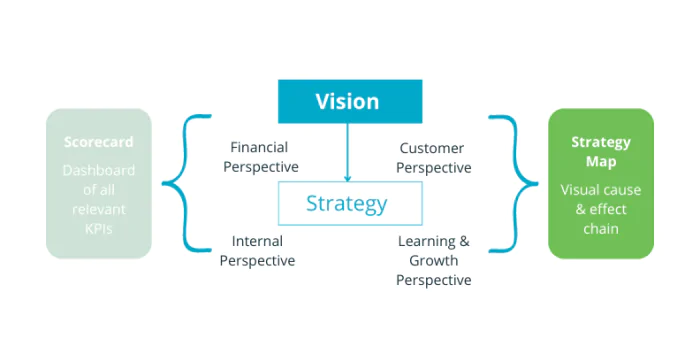The Balanced Scorecard
As you embark on your consulting career, understanding the fundamental tools that will help businesses prosper is crucial. One of these tools is the Balanced Scorecard (BSC), a strategic performance management tool that has transformed how businesses map out and execute their strategies.
The Birth of the Balanced Scorecard
The Balanced Scorecard was first introduced by Dr. Robert Kaplan and Dr. David Norton in 1992 in an article published by the Harvard Business Review. They had observed that the most successful businesses worldwide shared a common trait - they all had a clear vision and strategy that spanned across four key areas: Finance, Customers, Internal Processes, and Knowledge and Growth. These areas became the foundational perspectives of the Balanced Scorecard, a strategic tool that emphasizes balance between financial and non-financial measures.
Creating Perspectives: The Four Pillars of the Balanced Scorecard
The brilliance of the Balanced Scorecard lies in its four perspectives, which ensure that a business's strategy is all-encompassing.
- The Financial Perspective scrutinizes top-level financial objectives and measures. It essentially asks, "How do we appear to our shareholders?"
- The Customer Perspective hones in on customer satisfaction, answering the question, "How do our customers see us?"
- The Internal Processes Perspective assesses the efficiency of the business operations and whether they meet customer needs, asking, "What should we excel at?"
- The Learning and Growth Perspective focuses on people's development - their skills, training, leadership, and knowledge - and answers, "How can we improve and create value?"
These perspectives serve as a roadmap, leading to the creation of a strategy map. This is a simple, digestible statement of the company's strategy based on the four Balanced Scorecard perspectives. Each perspective is crucial in providing a well-rounded view of an organization's overall health and effectiveness. Understanding these components will give you a competitive edge when you step into your first consulting role.

The Art of Measuring: Tracking Progress
Once the objectives are set for each perspective, the next step is to measure progress against these objectives regularly. This is where performance measures come into play. Similar to how a doctor uses vital signs like pulse rate and temperature to assess a patient's health, performance measures serve as the business's vital signs.
It's important to note that these measures should contain both leading (predictive) and trailing (outcome) indicators. Too often, businesses lean on trailing measures because they are easy to quantify and precise. However, leading measures, though more challenging to identify, are the only ones that can be influenced and hence can make a difference. To succeed, it's better to focus on a handful of things that can instigate change rather than spreading oneself too thin.
The Value of the Balanced Scorecard in Consulting
In the consulting industry, the BSC is not just beneficial, but it's a game-changer. As consultants, we are often brought in to solve complex business problems and drive strategic growth, and it serves as a compass to guide these efforts.
The Balanced Scorecard offers a structured, systematic approach to measuring and managing performance, capturing a multitude of facets from financial results to customer satisfaction, operational efficiency, and even employee learning and growth. This comprehensive outlook enables consultants to understand the interconnections within an organization and identify areas for improvement that may not be immediately apparent.
The tool's focus on strategic alignment is another crucial asset. It encourages every level of the organization, from top management to frontline employees, to align their actions with the overarching business strategy. This alignment bridges the gap between strategy and execution, a common challenge in many businesses. As a consultant, being able to drive this alignment is instrumental in fostering organizational coherence and effectiveness.
The BSC also enables consultants to deliver high-impact recommendations that are actionable, measurable, and congruent with strategic goals. Its framework ensures that all proposed solutions are aligned with the company's strategic objectives, improving the chances of implementation success. Furthermore, the BSC's emphasis on both leading and lagging indicators allows consultants to establish a roadmap for clients, outlining not just what they need to achieve (lagging indicators) but also how to get there (leading indicators).
Lastly, the Balanced Scorecard facilitates effective communication within and across teams. Its straightforward, visual nature enables clear articulation of strategy and objectives, ensuring everyone in the organization understands their role in the big picture. This feature is invaluable in change management, a common mandate in consulting engagements, as it helps garner buy-in, facilitate understanding, and foster a culture of transparency.
Understanding the Challenges and Limitations of the Balanced Scorecard
While the Balanced Scorecard is a versatile and powerful tool, it isn't without its constraints. It's critical to acknowledge and understand these limitations to optimally utilize the BSC and ensure that its application aligns with your consulting objectives and clients' needs.
One of the primary challenges with the BSC is the significant investment of time and resources it demands. Developing a Balanced Scorecard is not a task that can be completed overnight. It requires careful thought and consideration to determine the right strategic objectives and corresponding performance measures. Moreover, the BSC isn't a 'set and forget' tool; it necessitates ongoing maintenance to reflect evolving organizational goals and market conditions. This continued effort requires a dedicated team and, thus, a substantial investment of human and financial resources.
The BSC relies heavily on the quality and accuracy of the data it receives. The saying "garbage in, garbage out" holds true for this strategic management tool. If the data used to measure performance is inaccurate, outdated, or biased, it can lead to misleading results, which can in turn prompt ill-informed strategic decisions. Thus, organizations need to invest in robust data management processes to ensure data integrity.
The Balanced Scorecard also tends to focus on internal processes and measures, which can inadvertently lead to a degree of insularity. While it encourages a look at the organization from various perspectives, the tool can sometimes downplay the importance of external factors such as market trends, competitive dynamics, and macroeconomic indicators. As consultants, we need to ensure we balance the insights from the BSC with a keen understanding of the wider business environment.
Why the Balanced Scorecard Matters to You as a Budding Consultant
There's truth in the adage, "What gets measured gets managed." This statement captures the essence of the Balanced Scorecard (BSC), a versatile tool that creates a comprehensive overview of an organization's performance. By effectively measuring varied yet interconnected business areas, it helps drive alignment with strategic objectives, fosters a unified language across teams, and ultimately promotes a higher level of organizational performance that is closely aligned with business strategy.
As a prospective entrant into the world of consulting, mastering the Balanced Scorecard is not just beneficial; it's indispensable. Here's why:
- First, the BSC provides a structured and holistic framework for setting, tracking, and measuring strategic objectives. As a consultant, you will be tasked with helping businesses navigate their strategic paths. The Blanced Scorecard is a potent tool that can enable you to drive strategic alignment and accountability across all levels of the organization. This alignment is crucial for the successful execution of strategy.
- Second, the BSC isn't just about numbers; it's about fostering clear communication. With the Balanced Scorecard, you can help create a shared language within an organization, bridging gaps between different departments and levels of hierarchy. This shared language can dramatically improve internal communication and understanding, thus boosting overall organizational efficiency and collaboration.
- Third, the BSC is about achieving sustainable growth. By focusing on a balanced set of performance measures, financial, customer, internal processes, and learning and growth, the Balanced Scorecard ensures that organizations don't lose sight of the big picture in the pursuit of short-term goals. As a consultant, you can guide organizations to optimize their performance in these key areas and achieve balanced, sustainable growth.
In essence, mastering the BSC is about enhancing your ability to create value for your clients. By integrating this powerful tool into your consulting toolkit, you can help businesses craft effective strategies, streamline operations, and foster a culture of continuous improvement and learning, all of which are critical to achieving long-term success in today's rapidly evolving business landscape. As such, the Balanced Scorecard could indeed be your secret weapon in the competitive world of consulting.


